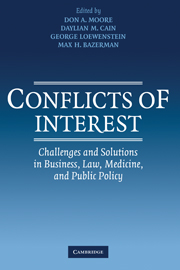Book contents
- Frontmatter
- Contents
- List of Contributors
- Acknowledgments
- Introduction
- PART ONE BUSINESS
- 1 Managing Conflicts of Interest within Organizations: Does Activating Social Values Change the Impact of Self-Interest on Behavior?
- 2 Commentary: On Tyler's “Managing Conflicts of Interest within Organizations”
- 3 A Review of Experimental and Archival Conflicts-of-Interest Research in Auditing
- 4 Commentary: Conflicts of Interest in Accounting
- 5 Bounded Ethicality as a Psychological Barrier to Recognizing Conflicts of Interest
- 6 Commentary: Bounded Ethicality and Conflicts of Interest
- 7 Coming Clean but Playing Dirtier: The Shortcomings of Disclosure as a Solution to Conflicts of Interest
- 8 Commentary: Psychologically Naive Assumptions about the Perils of Conflicts of Interest
- PART TWO MEDICINE
- PART THREE LAW
- PART FOUR PUBLIC POLICY
- Index
- References
1 - Managing Conflicts of Interest within Organizations: Does Activating Social Values Change the Impact of Self-Interest on Behavior?
Published online by Cambridge University Press: 04 August 2010
- Frontmatter
- Contents
- List of Contributors
- Acknowledgments
- Introduction
- PART ONE BUSINESS
- 1 Managing Conflicts of Interest within Organizations: Does Activating Social Values Change the Impact of Self-Interest on Behavior?
- 2 Commentary: On Tyler's “Managing Conflicts of Interest within Organizations”
- 3 A Review of Experimental and Archival Conflicts-of-Interest Research in Auditing
- 4 Commentary: Conflicts of Interest in Accounting
- 5 Bounded Ethicality as a Psychological Barrier to Recognizing Conflicts of Interest
- 6 Commentary: Bounded Ethicality and Conflicts of Interest
- 7 Coming Clean but Playing Dirtier: The Shortcomings of Disclosure as a Solution to Conflicts of Interest
- 8 Commentary: Psychologically Naive Assumptions about the Perils of Conflicts of Interest
- PART TWO MEDICINE
- PART THREE LAW
- PART FOUR PUBLIC POLICY
- Index
- References
Summary
ABSTRACT
Many organizational conflicts involve tensions between a person's motivation to act in their own self-interest and the efforts to authorities, rules, and institutions to bring people's conduct into line with social values involving justice and morality. This chapter explores the manner in which people in organizational settings manage personal conflicts between their self-interest and their views about what is just or moral. Past explorations of people's behavior in mixed-motive situations presents behavior as developing from a balancing of self-interested and moral/justice-based motivations. In contrast, the approach used here – the social value activation model – focuses on the consequences of activating social values. The results of several studies suggest that self-interested and ethical motivations interact, that is, once people's ethical motivations are activated they subsequently give less weight to calculations of personal self-interest when making behavioral decisions. Implications for the management of conflicts of interest in organizations are explored.
When people make decisions within organizations, they are often faced with conflicting motivations. One motivation is to act in ways that benefit themselves and/or the groups to which they belong in the immediate situation – the motive of personal or group self-interest. This motivation is often partially or even completely at odds with the motivation to make decisions in ways that are consistent with their justice-based or moral values. Hence, people have to trade off between their concerns about their self-interest and their desire to act based on their judgments about what is just and/or morally right.
- Type
- Chapter
- Information
- Conflicts of InterestChallenges and Solutions in Business, Law, Medicine, and Public Policy, pp. 13 - 35Publisher: Cambridge University PressPrint publication year: 2005
References
- 12
- Cited by



